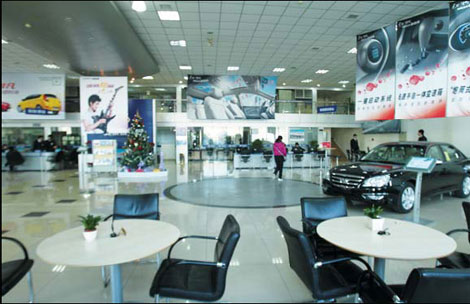BizChina
- Details
- By David Cao
- Hits: 1288
China's economy unexpectedly accelerated in the fourth quarter of 2010 despite a series of tightening measures, spotlighting Beijing's difficulties managing growth and fueling market concerns about further government moves to combat inflation.
The fourth quarter's 9.8% expansion in China's gross domestic product makes it all but certain that China became the world's second largest economy in 2010, ending Japan's 42-year reign in that position—although Japan doesn't report its year-end economic data until next month. Acknowledging the milestone and the anxiety its impending arrival has caused some Japanese, Japan's minister of economic and fiscal policy, Kaoru Yosano, said it appears likely that China has surpassed Japan and that "the Japanese people should welcome our neighbor China's growth."
China's economy surpassed Japan's based on quarterly data for the two countries in the March-June period, but global rankings are generally based on full-year output. China's economy remains much smaller than that of the U.S: For the full year, China's GDP grew 10.3%—up from 9.2% growth in 2009—to about $5.88 trillion. The International Monetary Fund forecast in October that U.S. GDP would top $14.62 trillion.
Read more: China GDP Expands 9.8% Despite Tightening Measures
- Details
- By David Cao
- Hits: 1618

President Obama’s joint press conference with Chinese President Hu Jintao at the White House Wednesday may be remembered more for its translation snafus than anything else. But the biggest news of the actual summit so far is the corporate dealmaking.
As a central feature of Hu’s state visit, the White House announced $45 billion worth of trade and investment deals with Beijing. China has approved the purchase of 200 planes from Boeing, for an estimated $19 billion. General Electric is part of several announced deals, including a project to expand high-speed rail in the U.S. using Chinese technology and a joint effort with Shenhua Gasification to building clean energy generators. American Electric Power and Duke Energy are also participating in clean energy projects in China. The Obama administration says that Chinese companies have signed 70 contracts–in the agriculture, machinery, chemical and other sectors–that could boost exports in 12 states by a total of $25 billion.
- Details
- By David Cao
- Hits: 1315
Not long after Mark Zuckerberg paid visits to some of China’s biggest tech companies, another tech tycoon, Skype and Kazaa co-founder Niklas Zennström, is making the rounds as well. But unlike the young Facebook chief, Mr. Zennström is no stranger to the complexities of China’s market.
The 44-year-old Swede, who along with co-founder Janus Friis currently owns a 14% stake in Skype and sits on the company’s board, is in Beijing this week meeting with executives from Baidu, Alibaba Group, Lenovo, China Mobile and others. His visit happens to come in the wake of a media frenzy over Chinese government talk of a crackdown on voice-over-Internet-protocol, or VoIP, phone services—which some outlets interpreted as being aimed at Skype, even though there’s no evidence that Skype is the target and the company says it continues to operate as normal.
In an interview with The Wall Street Journal, Mr. Zennström didn’t wade into the speculation over Skype’s fate in China. But he argued that VoIP services like Skype shouldn’t be seen as a threat to the legacy telecommunications industry. People “are not making fewer phone calls. As a matter of fact there are more phone calls made every year,” he said. “Communication is increasing.”
In addition, he pointed out, calls made from Skype to regular telephones are handled by traditional telecom operators, who are paid for the connections and therefore earn revenue from Skype. (This is true in China, too).
- Details
- By David Cao
- Hits: 1513

With Beijing's new traffic policies in operation and people swamping an official website to try to snag coveted approval to buy a car through the new lottery system, car dealers have seen a sharp fall in business.
There was a rush to snap up a car during the weeks before the new rules came into effect but the 10 days since then have been quiet.
Zhang Jicheng, a manger at a Peugeot dealership near the North Fifth Ring Road, said they have had ample supply of new autos but a shortage of customers since Dec 23 when the new rules came in.
"We haven't seen local customers coming in during the past 10 days," Zhang told METRO.
He said the dealership ran out of cars in the days before Dec 23.
And he said hundreds of inquiries came in that night and his staff stayed up all night dealing with contracts.
The website of the license-plate lottery system has been working since Jan 1 and offices in 16 districts will open to enhance that online system today.
- Details
- By David Cao
- Hits: 1372
China wants to develop the untapped purchasing potential of its domestic consumers and hopes Berlin will support the expansion of Chinese companies in Germany, a top Beijing official said on Wednesday.
Chinese firms should have the chance to further boost some $1 billion in investments in Germany, Vice-Premier Li Keqiang wrote in a guest editorial in the Sueddeutsche Zeitung ahead of his three-day visit to the country later this week.
"We would be happy if ...the conditions for Chinese companies could be improved for investments and business start-ups in Germany."
Li reaffirmed Beijing would support the European Union in sorting out its sovereign debt crisis, and raised the hope that the EU might ease restrictions for high-tech products to China, which he said would create balanced and sustainable trade relations.
More Articles …
Page 40 of 120